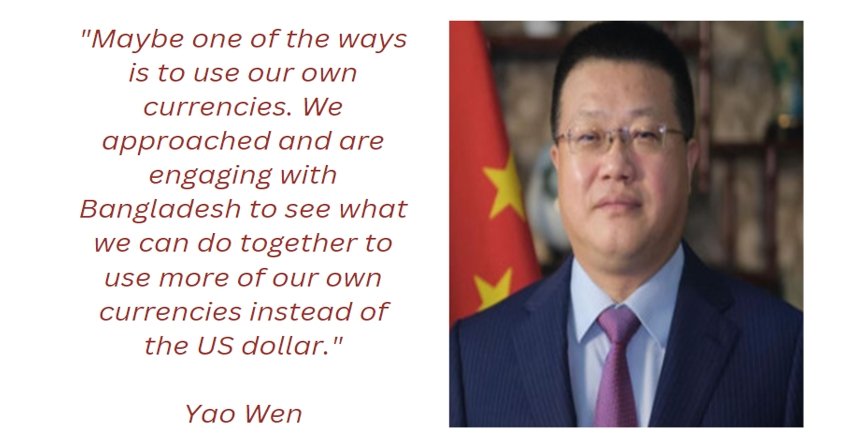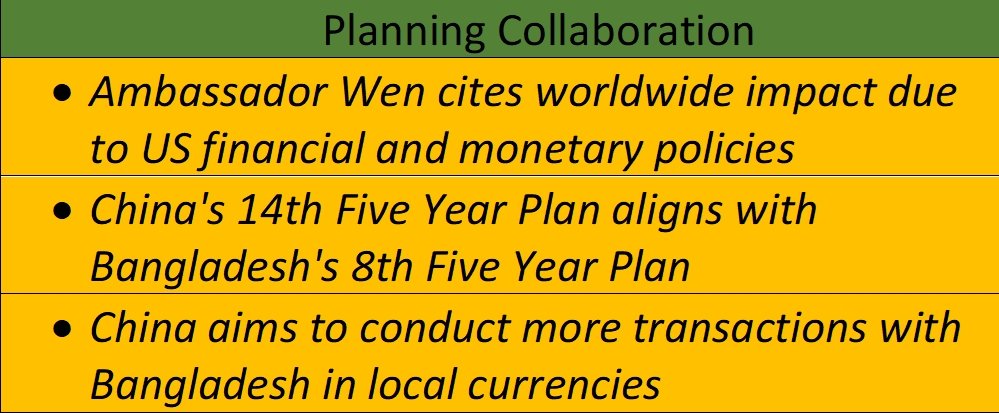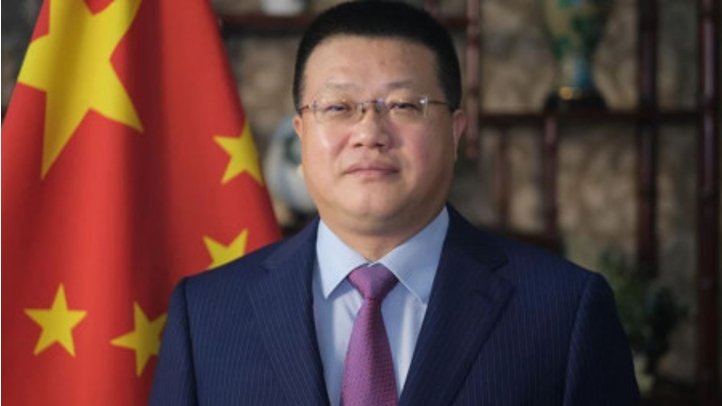Despite the widespread use of the American Dollar in global transactions, it is important to note that, among the 180 currencies recognized by the United Nations, the U.S. Dollar does not officially hold the title of the world’s most powerful currency. Despite being the largest global economy, the United States has not unilaterally designated the American Dollar as the preeminent currency on a global scale.
You can also read: Geopolitical Tensions Disrupt global Trade
The strength of a currency is assessed within the framework of global commerce, reflecting not only a country’s economic strength but also influencing its overall economic resilience. Increasing a currency’s strength instills confidence in the nation’s economy, making it attractive for investments and enhancing international participation. Over several decades, the United States Dollar has generally been acknowledged as the most dominant global currency.

The Proposal
In this context, the Chinese Ambassador to Bangladesh, Yao Wen, announced today the intention of his country to conduct more transactions with Bangladesh using Chinese or Bangladeshi currencies rather than the US dollar. This proposal comes in response to the ongoing fluctuations in the dollar exchange rate, a concern shared not only by China but also by developing nations across the globe.
Wen highlighted the worldwide impact of the fluctuating dollar rate, attributing it to the financial and monetary policies of the United States. He remarked, “Now it’s a worldwide problem. This is the fluctuation of the dollar rate because of the financial and monetary policy of the US. So, the global south, the developing countries as well as China also are facing the same problem. This is something where China wishes to work with Bangladesh.”
The ambassador shared these insights with reporters after a meeting with Planning Minister Major General (Retd) Abdus Salam at the latter’s office in the capital’s Sher-e-Bangla Nagar.
Exploring Areas of Cooperation in Economic Planning
During the meeting, Ambassador Wen and Minister Abdus Salam discussed possible areas of cooperation between the National Development and Reform Commission (NDRC) of China and the Bangladesh Planning Commission.
Highlighting the potential for collaboration, Wen remarked, “China has already the 14th Five Year Plan while Bangladesh is having its 8th Five Year Plan. So, we can see we’ve great potentials to cooperate and work on this area…we can share experiences and can cooperate on this Five Year Plan.”
The statement underscores the shared commitment of China and Bangladesh to leverage their respective national development plans for collaborative efforts. The exchange of experiences and ideas between the two nations could pave the way for innovative strategies, fostering economic resilience and sustainable growth.
As both countries explore avenues to navigate global economic challenges, this collaboration on long-term planning marks a significant step towards a strengthened bilateral relationship. The joint efforts on the Five-Year Plans are expected to bring forth a range of initiatives aimed at addressing shared developmental goals and reinforcing economic ties between China and Bangladesh.

China’s Interest in Bangladesh’s Five-Year Plan
Minister Abdus Salam acknowledged China’s interest in discussing Bangladesh’s Five-Year Plan, underscoring the strong relationship between the two nations. He noted that China has been instrumental in assisting Bangladesh in implementing its five-year plans.
Addressing concerns about the disbursement of promised funds from China, the planning minister assured that any minor issues would be resolved through diplomatic discussions.
As China and Bangladesh explore alternative currencies for their transactions and delve into collaborative economic planning, this development underscores the commitment of both nations to navigate global challenges together and strengthen their economic ties. The proposed shift towards using local currencies not only addresses the challenges posed by the fluctuating dollar but also opens avenues for a more sustainable and mutually beneficial economic partnership.
Assurance of Continued Support
Responding to inquiries about China’s commitment to supporting Bangladesh’s Five-Year Plan, the planning minister expressed gratitude for China’s interest in discussing the country’s development strategies. He noted that China has a strong relationship with Bangladesh and has played a significant role in successfully implementing the country’s previous five-year plans.
Addressing concerns about the disbursement of promised funds from China, Minister Abdus Salam assured that any minor issues would be resolved through diplomatic discussions. This reiterates the commitment of both nations to maintaining a robust and cooperative relationship for mutual benefit.
As China and Bangladesh explore new avenues for economic collaboration and seek alternatives to the US dollar in their transactions, this development marks a significant step towards reinforcing the economic ties between the two countries. The proposal to utilize local currencies not only addresses the challenges posed by the fluctuating dollar but also opens doors for a more sustainable and mutually beneficial economic partnership.

Boosting Trade and Collaboration
Chinese Ambassador to Bangladesh, Yao Wen, has suggested an uptick in transactions using Chinese or Bangladeshi currencies, stepping away from US dollars amidst the current fluctuations in the dollar exchange rate.
Addressing the global issue of dollar rate fluctuations, Yao Wen stated, “The fluctuation of the dollar rate is now a worldwide problem which China is also facing. It is something that China wishes to work with Bangladesh. Maybe one of the ways is to use our own currencies.” This proposal was made following a meeting with Planning Minister Major General (retd) Abdus Salam in the capital’s Agargaon on January 30.
“We approached and are engaging with Bangladesh to see what we can do together to use our own currencies instead of the US dollar,” added Yao Wen, reflecting the shared interest in finding alternative solutions.
The planning minister acknowledged China’s interest in discussing Bangladesh’s 14th Five-Year Plan, highlighting the robust relationship between the two nations and China’s support in implementing Bangladesh’s five-year plans.
Responding to queries about the slow disbursement of promised funds from China, the planning minister assured that any minor issues would be addressed through discussion, reaffirming the commitment to resolving any challenges in the spirit of collaboration.


